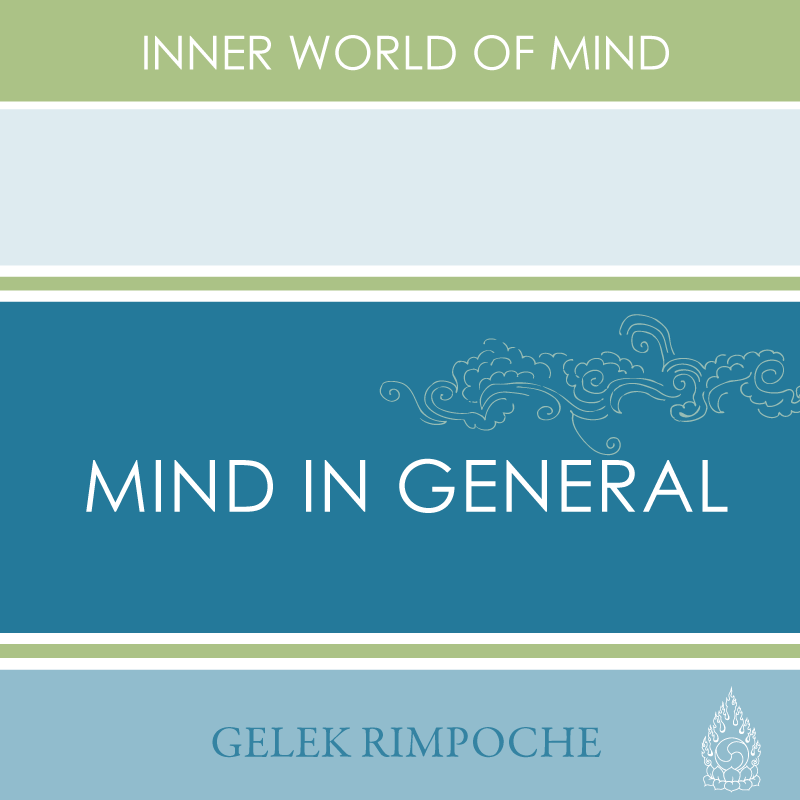Mind In General


Introducing Mind
Lesson Number 1 of 5
The mind is the source of all development—material as well as spiritual. All of the achievements of modern science and technology, as well as all of our spiritual developments—such as wisdom and compassion—ultimately come from the mind. Understanding the mind is of crucial importance to the spiritual practitioner.
This is first in a series of lessons in which Gelek Rimpoche describes the basis of Buddhist psychology, the Mind and the Mental Faculties, based upon an 18th century commentary by Kachen Yeshe Gyaltsen, the teacher of the 8th Dalai Lama, which brings together important and practical features of this vast and sophisticated traditional system of Buddhist psychology, philosophy of mind and cognitive theory.

Definitions of Mind
Lesson Number 2 of 5
According to the Buddha, the physical aspects of reality (forms, including our bodies) do not arise independently, but are dependent upon causes and conditions, and thereby impermanent. Of course we recognize that our bodies are not permanent, and will change, fall apart, and eventually dissolve. But Buddha says even mind is dependent upon causes and conditions and thus also is impermanent. If mind is impermanent, how does it carry on from life to life? What are the qualities of mind, and how does it function?
In this lesson, Gelek Rimpoche discusses the qualities of mind or the consciousness which perceives and knows, and introduces the concept of the“Mental Faculties”, which are the cognitive elements that allow the consciousness to discriminate, ascertain, and qualify the objects it cognizes.

Importance of Mind
Lesson Number 3 of 5
Mind is not physical. While mind works in coordination with the physical body, mind itself has no form or shape. Mind functions to perceive reality. By nature it is clear and luminous, perceiving and reflecting reality like a mirror. But like a dirty rag rubbing oil over a mirror, our negativities can temporarily cloud and block the capacity of the mind to perceive reality purely. There are also multiple levels of mind.
Underlying the gross mind—which we ordinarily see and which is easily affected by emotions—we have a subtler mind, and deeper still, an even subtler mind known as the primordial mind. In this lesson, Gelek Rimpoche explains that through the process of meditation, it can become possible to unlock these various aspects of mind.

Subtle Mind and Subtle Physical Energy
Lesson Number 4 of 5
Mind comes only from mind. Consciousness did not simply spring up in this life out of nowhere because of a particular configuration of physical elements in one’s brain and body. Rather, one’s mind today is a continuation of one’s mind from previous lives. In this lesson, Gelek Rimpoche explains that while mind is not physical, it does interact with the physical in the form of subtle energy or life-force that the Tibetans call Lung.
The mind rides upon the subtle energy like a rider rides upon a horse, it is the physical vehicle that carries the mind and allows it to function within the physical body. When the physical body becomes unserviceable at the time of death, the connections will be cut and the gross consciousness will dissolve. But the Primordial Mind will remain and will be carried to our next rebirth.

Mind and Mental Faculties
Lesson Number 5 of 5
The mind perceives and is aware. In this lesson, Gelek Rimpoche explains how the mental faculties help the mind to discriminate, recognize, ascertain and understand. The mind has six primary consciousnesses, corresponding to the five senses (sight, hearing, smell, taste, and touch) and the primary mental consciousness.
The mental faculties are divided into fifty-one specific functions. The mental faculties have different functions and capacities which Rimpoche addresses over the course of this series.

